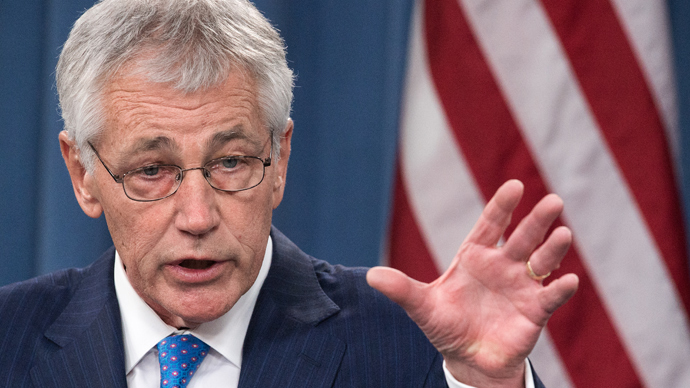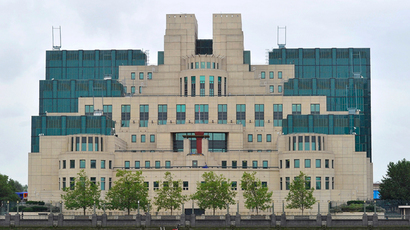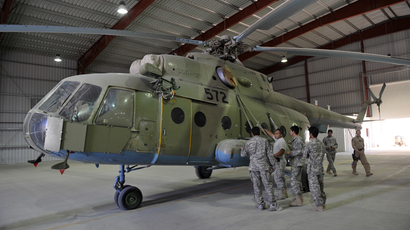US offers ‘closer cooperation’ on security, Russia vows Olympics are safe

In the wake of the Volgograd terrorist attacks, Washington has offered ''closer cooperation'' with Russia on security for the Sochi 2014 Winter Olympics. Russia says all measures required to make the Games safe have already been taken.
The latest offer of counterterrorism cooperation came from US Secretary of Defense Chuck Hagel, who spoke to his Russian counterpart, Sergey Shoigu, in a phone conversation.
"Secretary Hagel also assured Minister Shoigu that the United States stands ready to provide security assistance to Russia for the Winter Olympics in Sochi, if requested," Pentagon spokesman Rear Admiral John Kirby said.
"The leaders discussed the need to remain vigilant against these threats and considered additional opportunities to deepen our nations’ counterterrorism cooperation,” Kirby said.
Hagel's phone call came days after two bombings left 34 people dead in the southern Russian city of Volgograd just before the New Year. The bombings sparked doubts among some people over Russia’s ability to protect athletes and spectators at the Olympics, which are to kick off next month.
Every measure feasible taken
Following the tragic attacks, US had earlier offered ''liaison” help during the Sochi Olympics. Washington has proposed that the US effort be headed by the State Department's Bureau of Diplomatic Security.
''The US government has offered our full support to the Russian government in security preparations for the Sochi Olympic Games,'' White House spokeswoman Caitlin Hayden said in the wake of the second bombing Monday. ''We would welcome the opportunity for closer cooperation for the safety of the athletes, spectators and other participants.''
But Moscow insisted that the terrorism threat does not require any additional measures. The president of the Russian Olympic Committee, Aleksandr Zhukov, said Monday that every possible security measure is already in place in Sochi.
The measures he was referring to include surveillance drones, which will be used to safeguard security at the Olympics for the first time at Sochi. In addition, two sonar systems to detect submarines and protect the Olympics from a sea-launched terror attack will be used.
Conventional security forces will see more than 40,000 police on duty, and more than 5,000 surveillance cameras installed across the city will help the counterterrorism effort.
Russia’s stance was reiterated Saturday, when President Vladimir Putin was in Sochi to inspect preparations for the Games. He signed a decree that allows mass gatherings not directly related to the Olympic and Paralympic Games in the city. Previously they would not be allowed in the city during the games, which gave grounds for criticism of Russia, because the ban made impossible political protests in Sochi.
The International Olympic Committee (IOC) welcomed the announcement, saying it was “in line with the promises that President Putin gave us last year and is in accordance with the plans of the Russian authorities, which guarantee freedom of speech despite the high security during the Games.”
Terrorists target international resolve
International Olympic officials expressed their confidence in Russia’s security measures for the Games. Following the Volgograd attacks, IOC President Thomas Bach said he was sure that Russia would produce a "safe and secure'' Olympics.
"I am certain that everything will be done to ensure the security of the athletes and all the participants of the Olympic Games," Bach said.
The Volgograd bombings, just a month before the launch of the Games are unlikely to be coincidence, and are targeting the resolve of future Sochi visitors, experts say.
"They are trying to hurt the image that Russia is a peaceful, balanced and harmonious society... and show the world that there is obviously a lack of control of the security situation,” said the head of International Center for Counter-Terrorism, Peter Knoope.
"One of the biggest challenges is how to maintain the wider national security levels given the focus on Sochi," Andrew Amery, who oversaw security at the 2012 Summer Olympics in London, told AP. "This is an issue that is always realized early in the planning and... the risk of course is at the perimeter, as we saw in the recent tragic events."
The Sochi Olympics will be held from February 7-23 some 700 kilometers southwest of Volgograd, where the New Year bombings happened.
The blasts come several months after a statement by Chechen terrorist leader Doku Umarov, who called on Islamist militants in Russia's North Caucasus to sabotage the Sochi Games.
He urged jihadist fighters to "do their utmost to derail" the games, which he called "Satanic dances on the bones of our ancestors."
"We have the obligation to use all means to prevent this," Umarov said in a video posted on a rebel website.
But a Norwegian member of the International Olympic Committee (IOC), who helped organize the 1994 Lillehammer Games, says that security measures at the Games should be equal to the challenge.
"When we come to Sochi, it will be impossible for the terrorists to do anything," said IOC’s Gerhard Heiberg. "The [Olympic Village] will be sealed off from the outside world. Security has been our priority No. 1 ever since Sochi got the Games... For Russia, this is a matter of national pride."














